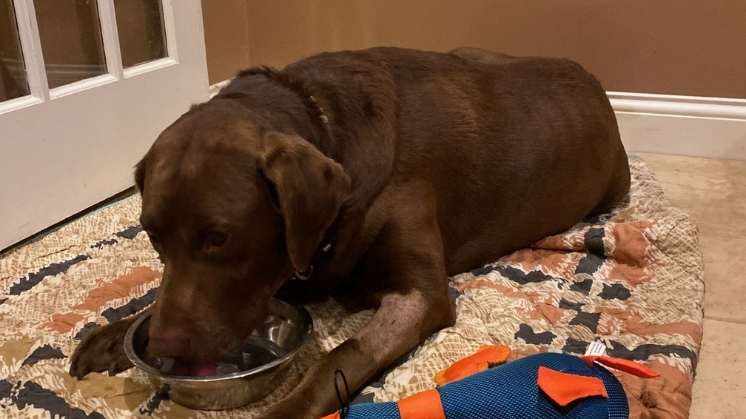
Why Do Labrador Retrievers Eat Everything?
If you're a Labrador Retriever owner, you've likely experienced the horror of watching your beloved dog inhale their dinner in under thirty seconds, followed immediately by those pleading eyes begging for more. Perhaps you've caught them red-pawed, destroying your favorite shoes, or discovered they've somehow managed to swallow an entire sock during your five-minute bathroom break.
You're not alone, and more importantly, you're not dealing with a "bad" dog. Labrador Retrievers are legendary for their insatiable appetites and their tendency to treat the entire world as one giant buffet. While this behavior might seem frustrating or even amusing when they're young, it becomes increasingly concerning as our Labs enter their senior years.
Understanding why your Labrador eats everything—and knowing when this behavior crosses the line from quirky breed trait to serious health concern—is crucial for every Lab owner, especially those caring for senior dogs who face unique challenges and health risks.
The Science Behind Your Labrador's Endless Appetite
Labrador Retrievers aren't just being dramatic when they act like they're starving five minutes after finishing a full meal. There's actual science behind their seemingly bottomless stomachs, and it starts with their genes.
The POMC Gene Mutation: When "Full" Doesn't Exist
Groundbreaking research from the University of Cambridge revealed that approximately 23% of Labrador Retrievers carry a mutation in the POMC (pro-opiomelanocortin) gene. This gene plays a crucial role in appetite regulation and the feeling of satiety—essentially, it's what tells your brain "I'm full, stop eating."
Dogs with this mutation have a disrupted satiety pathway, meaning they may literally never experience the satisfied feeling that comes after a good meal. Instead, they remain in a constant state of food motivation, always ready for the next opportunity to eat. This isn't learned behavior or poor training—it's hardwired into their DNA.
The mutation affects the production of β-endorphin and α-melanocyte stimulating hormone, both critical for appetite control. Labs with this genetic variation showed increased food motivation and were more likely to beg for food, scavenge, and overeat compared to Labs without the mutation.
Evolutionary Advantages That Became Modern Problems
This genetic predisposition didn't develop by accident. Labrador Retrievers were originally bred as working dogs in the harsh coastal regions of Newfoundland. These dogs needed to work long, demanding days retrieving fish and game in cold, unforgiving conditions.
In such an environment, a dog that would eat whenever food was available—regardless of whether they felt "hungry"—had a significant survival advantage. These dogs could store energy for the long working days ahead and were less likely to refuse food when it was scarce.
The traits that made Labs excellent working companions—food motivation, eagerness to please, and the drive to consume available resources—are the same traits that make modern Labs prone to overeating and scavenging in our food-abundant homes.
Normal vs. Problematic Eating Behaviors in Labradors
Given their genetic predisposition, it's important to understand what constitutes normal Labrador eating behavior versus concerning patterns that require intervention.
Normal Labrador Retriever Eating Behaviors
Typical, healthy eating behaviors in Labs include:
Enthusiastic meal times: Your Lab eagerly anticipates meals and eats with gusto. They might dance around the kitchen during food preparation or gulp their kibble quickly.
Food-motivated training: Labs respond exceptionally well to food rewards and may become more attentive and obedient when treats are involved.
Opportunistic snacking: Checking the ground during walks for dropped food, showing interest in your meals, or investigating interesting smells is normal curiosity.
Begging behavior: Those famous Lab puppy eyes during dinner time are classic breed behavior, especially if they've been inadvertently rewarded with table scraps in the past.
Problematic Eating Patterns That Require Attention
However, certain behaviors cross the line from normal Lab enthusiasm to concerning patterns:
Counter surfing and food theft: Systematically stealing food from counters, tables, or other dogs' bowls indicates an unhealthy level of food obsession.
Pica (eating non-food items): Regularly consuming socks, rocks, sticks, plastic, or other inedible objects is dangerous and abnormal.
Aggressive food guarding: Becoming possessive or aggressive around food bowls, treats, or found items.
Constant scavenging: Obsessively searching for food to the point where it interferes with normal activities like walks or playtime.
Refusal to stop eating: Continuing to eat even when visibly uncomfortable or after vomiting.
Why Senior Labradors Face Unique Eating Challenges
As Labradors age, their relationship with food often becomes more complex. Senior Labs (typically 7+ years old) face physiological and psychological changes that can dramatically alter their eating behaviors.
Increased Appetite in Senior Labrador Retrievers
Many senior Labradors actually become more food-focused as they age, and this increase often catches owners off guard. Several factors contribute to this phenomenon:
Decreased activity levels: Senior Labs often have reduced mobility due to arthritis or other age-related conditions. With less physical exercise, they may turn to food-seeking behaviors as a form of mental stimulation and entertainment.
Medication side effects: Common medications prescribed to senior dogs, including corticosteroids for inflammation or certain pain medications, can significantly increase appetite. Dogs on these medications may seem insatiably hungry.
Metabolic changes: Aging affects metabolism, and some senior dogs develop conditions like Cushing's disease or diabetes that create constant hunger signals.
Cognitive changes: Senior dogs may develop canine cognitive dysfunction (similar to dementia in humans), which can disrupt normal eating patterns and cause confusion about meal times.
Routine disruption: Senior dogs often crave routine, and any disruption to their normal schedule can trigger anxiety-driven eating behaviors.
Decreased Appetite in Senior Labs
Conversely, some senior Labrador Retrievers may eat less than they used to, which can be equally concerning:
Dental problems: Painful teeth, gum disease, or oral tumors can make eating uncomfortable. Senior Labs may avoid hard kibble or show reluctance to chew.
Reduced sensory function: As dogs age, their senses of smell and taste decline. Food may simply become less appealing, leading to decreased interest in meals.
Underlying illness: Kidney disease, liver problems, cancer, or other serious conditions often manifest as appetite loss in senior dogs.
Gastrointestinal changes: Age-related changes in digestion can cause nausea, discomfort, or altered bowel habits that affect appetite.
Medical Conditions That Drive Excessive Eating in Senior Labs
When a previously well-behaved senior Labrador Retriever suddenly develops extreme eating behaviors, underlying medical conditions are often to blame. Early recognition and treatment of these conditions can dramatically improve your dog's quality of life.
Diabetes Mellitus
Diabetes is increasingly common in senior dogs and creates a vicious cycle of hunger. When blood sugar isn't properly regulated, cells can't access glucose for energy, triggering constant hunger signals. Diabetic dogs often display polyphagia (excessive eating), increased urination, excessive thirst, and weight loss despite increased appetite.
Senior Labs with diabetes may raid trash cans, beg constantly, or even attempt to eat inappropriate items in their desperate search for calories. Proper insulin management typically resolves these extreme behaviors.
Cushing's Disease (Hyperadrenocorticism)
This condition involves overproduction of cortisol, often called the "stress hormone." Cushing's disease is particularly common in older dogs and creates intense hunger that can be difficult to satisfy.
Labs with Cushing's often develop a characteristic pot-bellied appearance, excessive panting, increased urination, and an insatiable appetite. They may wake up in the middle of the night searching for food or become aggressive around meal times.
Thyroid Imbalances
Both hyperthyroidism and hypothyroidism can affect eating behaviors, though they present differently. Hyperthyroidism speeds up metabolism, creating constant hunger despite weight loss. Hypothyroidism slows metabolism and can lead to weight gain and changes in appetite patterns.
Thyroid imbalances are often overlooked because symptoms develop gradually, and owners may attribute changes to normal aging.
Exocrine Pancreatic Insufficiency (EPI)
This condition prevents proper digestion of nutrients, leaving dogs chronically malnourished despite eating normal amounts. Dogs with EPI often have enormous appetites, loose stools, and gradual weight loss.
Senior Labs with EPI may begin eating feces (their own or other animals'), which is their body's attempt to reclaim undigested nutrients.
Intestinal Parasites
While more common in puppies, senior dogs can also develop parasite infections that increase appetite. Parasites steal nutrients from the digestive system, leaving dogs feeling constantly hungry.
Regular fecal examinations are important for senior dogs, especially those showing increased appetite or changes in stool quality.
The Dangers of Indiscriminate Eating in Senior Labs
While a young Lab might recover quickly from eating something inappropriate, senior dogs face increased risks and complications from indiscriminate eating behaviors.
Choking and Obstruction Risks
Senior dogs often have decreased muscle tone and coordination, making them more prone to choking on large items or food bolted too quickly. Additionally, their digestive systems may be less resilient, increasing the risk of intestinal obstructions from foreign objects.
Common household items that cause obstructions in senior Labs include socks, underwear, children's toys, corn cobs, fruit pits, and rawhide chews. Emergency surgery to remove obstructions is particularly risky for senior dogs with underlying health conditions.
Toxic Exposures
Senior Labs may be more susceptible to toxins due to decreased liver and kidney function. Items that might cause mild upset in a young dog can be life-threatening for seniors.
Common toxic exposures include chocolate, xylitol (artificial sweetener), grapes and raisins, onions and garlic, macadamia nuts, and human medications. Even seemingly harmless items like bread dough can expand in the stomach and cause dangerous bloating.
Bloat (Gastric Dilatation-Volvulus)
Large, deep-chested breeds like Labradors are prone to bloat, a life-threatening condition where the stomach fills with gas and potentially twists. Risk factors increase with age, and eating behaviors like gulping food quickly, eating large meals, or consuming inappropriate items can trigger episodes.
Senior Labs who eat too quickly or consume large amounts of inappropriate material are at particular risk. Symptoms include a distended abdomen, unproductive retching, restlessness, and rapid breathing.
Comprehensive Management Strategies for Senior Labs
Managing eating behaviors in senior Labradors requires a multi-faceted approach that addresses their physical health, mental stimulation needs, and environmental factors.
Nutritional Management for Senior Labrador Retrievers
Age-appropriate feeding schedules: Senior dogs benefit from smaller, more frequent meals rather than one or two large portions. Consider three smaller meals daily to help with digestion and satisfaction.
High-quality senior formulations: Choose foods specifically formulated for senior dogs, which typically have adjusted protein levels, added joint support, and enhanced digestibility.
Calorie management: Senior Labs are prone to weight gain due to decreased activity. Work with your veterinarian to determine appropriate calorie intake and adjust portions based on body condition rather than just age or weight.
Fiber considerations: Higher fiber foods can help senior Labs feel more satisfied while managing weight. However, too much fiber can interfere with nutrient absorption, so balance is key.
Feeding Equipment and Environmental Modifications
Slow-feeder bowls: These specialized bowls force dogs to eat more slowly, improving digestion and increasing meal satisfaction. They're particularly important for senior Labs who gulp their food.
Puzzle feeders and food-dispensing toys: These tools provide mental stimulation while slowing down eating. Rotate different types to prevent boredom.
Elevated feeding stations: Senior Labs with arthritis or neck problems may benefit from raised food bowls that reduce strain during eating.
Separate feeding areas: If you have multiple pets, ensure your senior Lab has a quiet, stress-free place to eat without competition.
Environmental Management
Secure trash storage: Use tight-fitting lids or store garbage in cabinets. Senior Labs may have more time and determination to work at opening containers.
Counter management: Keep all food items well away from counter edges and use appliance locks if necessary.
Yard cleanup: Regularly remove fallen fruit, mushrooms, and other potentially harmful items from your yard.
Walk vigilance: Senior Labs may be less responsive to commands, so maintain closer supervision during walks and use a shorter leash in areas with potential food hazards.
Exercise and Mental Stimulation
While senior Labs may have physical limitations, mental exercise remains crucial for managing food-seeking behaviors.
Adapted physical exercise: Swimming is excellent for senior Labs with joint issues. Short, frequent walks are often better than long hikes. Consider physical therapy or underwater treadmill sessions for dogs with mobility issues.
Mental enrichment activities: Hide treats around the house, teach new tricks (yes, old dogs can learn!), provide snuffle mats for foraging, and rotate toys regularly to maintain interest.
Training reinforcement: Continue working on basic commands, especially "leave it" and "drop it." Senior dogs may need more frequent refresher sessions.
Training Techniques Specifically for Senior Labs
Training a senior Labrador requires patience and adaptations for their changing needs, but it's never too late to address problematic eating behaviors.
Essential Commands for Eating Safety
"Leave It" Command: This is perhaps the most important command for Labs prone to eating everything. Start with low-value items and gradually increase difficulty. Use high-value treats as rewards and practice daily in different contexts.
"Drop It" Command: Essential for when your Lab has already picked up something inappropriate. Trade for something better rather than simply taking items away, which can encourage resource guarding.
"Wait" or "Stay" Command: Useful for managing mealtime excitement and preventing food guarding behaviors. Have your Lab wait before being released to eat their meal.
Adapting Training for Senior Labrador Retrievers
Shorter, more frequent sessions: Senior dogs may tire more easily or have shorter attention spans. Keep training sessions to 5-10 minutes but conduct them more frequently throughout the day.
Consider physical limitations: Use verbal commands and hand signals that don't require uncomfortable positions. Dogs with hearing loss may need visual cues, while dogs with vision problems may rely more on verbal commands.
Higher value rewards: Senior dogs may be less food-motivated or have specific preferences. Experiment with different treats to find what motivates your individual dog.
Patience with regression: Senior dogs may occasionally forget training or seem confused. This could indicate cognitive changes and requires gentle, consistent reinforcement rather than correction.
Supplements and Nutritional Support for Senior Labs
Targeted supplementation can address some of the underlying factors that contribute to problematic eating behaviors in senior Labradors.
Digestive Health Supplements
Probiotics: Support healthy gut bacteria, which can improve digestion and nutrient absorption. This may help senior Labs feel more satisfied after meals.
Digestive enzymes: Can be particularly helpful for senior dogs with pancreatic insufficiency or other digestive disorders that leave them feeling constantly hungry.
Omega-3 fatty acids: Support overall health and may help with inflammation that could be affecting appetite or digestion.
Joint and Mobility Support
Glucosamine and chondroitin: May help maintain joint health and reduce pain that could be contributing to decreased activity and increased food-seeking behaviors.
MSM (methylsulfonylmethane): An anti-inflammatory supplement that may help with joint comfort.
Turmeric/curcumin: Natural anti-inflammatory that may help with overall comfort and wellbeing.
Cognitive and Behavioral Support
L-theanine: An amino acid that promotes calm, focused behavior without sedation. May help with anxiety-driven eating behaviors.
SAM-e (S-adenosylmethionine): Supports cognitive function and may help with age-related mental changes.
Valerian root or chamomile: Natural calming agents that may help reduce stress-related scavenging behaviors.
Important note: Always consult with your veterinarian before starting any supplement regimen, especially if your senior Lab is taking medications or has underlying health conditions.
When to Seek Veterinary Care
Knowing when your senior Lab's eating behavior requires professional intervention can be the difference between a minor issue and a life-threatening emergency.
Immediate Emergency Signs
Seek emergency veterinary care immediately if your senior Lab shows any of these symptoms:
Unproductive retching or vomiting: Especially if accompanied by a distended abdomen, which could indicate bloat.
Difficulty breathing: Could indicate choking or bloat.
Extreme lethargy or collapse: May indicate poisoning or severe illness.
Inability to defecate or producing only small amounts: Could indicate intestinal obstruction.
Pale gums or rapid heart rate: Signs of shock or severe illness.
Schedule a Veterinary Appointment Soon
Contact your veterinarian within 24-48 hours if you notice:
Sudden changes in appetite: Either dramatic increases or decreases in food interest.
Changes in drinking habits: Excessive thirst or complete loss of interest in water.
Alterations in bathroom habits: Changes in urination frequency, stool consistency, or accidents in house-trained dogs.
Behavioral changes: Increased anxiety, confusion, or changes in sleep patterns.
Weight changes: Rapid weight gain or loss, especially if eating habits haven't changed.
Regular Monitoring for Senior Labs
Senior Labradors should have more frequent veterinary checkups than younger dogs. Consider:
Biannual wellness exams: Every six months instead of annually, allowing for early detection of age-related conditions.
Regular blood work: Annual or biannual blood panels can detect diabetes, thyroid issues, kidney problems, and other conditions before symptoms become severe.
Weight monitoring: Regular weigh-ins at home or at the veterinary clinic help track changes that might not be visible day-to-day.
Dental evaluations: Regular dental checkups and cleanings become more important as dogs age and may be at higher risk for anesthesia complications.
Creating a Long-term Management Plan
Successfully managing a senior Labrador's eating behaviors requires a comprehensive, long-term approach that evolves with your dog's changing needs.
Working with Your Veterinary Team
Develop a partnership with your veterinarian that includes regular communication about your Lab's eating behaviors, weight management, and overall health. Keep a food diary noting what and when your dog eats, any problematic behaviors, and their response to interventions.
Consider consulting with a veterinary nutritionist for complex cases or dogs with multiple health conditions. Board-certified veterinary behaviorists can help with severe behavioral issues that don't respond to basic management techniques.
Adapting Care as Your Lab Ages
Be prepared to modify your approach as your senior Lab continues to age. What works at age 8 may need adjustment at age 12. Regular reassessment of diet, exercise capabilities, and mental stimulation needs will help you stay ahead of problems.
Consider quality of life evaluations as part of your routine care. While eating everything isn't necessarily a quality of life issue, the underlying conditions that drive this behavior sometimes are.
Final Thoughts: Living Successfully with a Food-Obsessed Senior Labrador Retriever
Owning a Labrador Retriever means accepting that food will always be a central part of your relationship. These dogs were bred to be food-motivated, and that trait has served them well throughout their history as working companions and beloved family pets.
For senior Labs, managing eating behaviors becomes both more challenging and more critical. Their aging bodies are less forgiving of dietary indiscretions, but their minds may be more set in their ways. Success comes from understanding your individual dog's needs, maintaining consistency in management approaches, and staying vigilant for changes that might indicate underlying health issues.
Remember that your senior Lab's food obsession isn't a character flaw or a sign of poor training—it's a natural expression of their genetics and breed history. With patience, proper management, and veterinary support, you can help your senior Labrador live safely and happily while accommodating their food-focused nature.
The goal isn't to completely eliminate your Lab's interest in food (an impossible task!), but rather to channel it safely and ensure it doesn't compromise their health or your peace of mind. With the right approach, your senior Lab can continue to be the food-loving, tail-wagging companion you've always cherished, just with a few more management strategies in place.
Every senior Labrador deserves to age gracefully while still expressing their natural behaviors safely. By understanding the science behind their eating habits, recognizing when behaviors become problematic, and implementing comprehensive management strategies, you're giving your beloved companion the best chance at a healthy, happy senior life—even if they still think every day should revolve around the next meal.
📸 Photo Credits: Featured images in this article are licensed from Shutterstock



